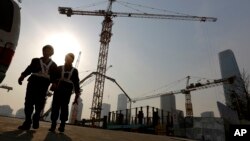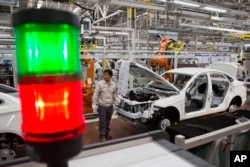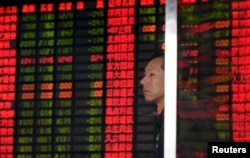Analysts in China say the country's ongoing efforts at economic reform are facing rare resistance from Communist leaders in Chinese provinces, state-owned enterprises (SOEs), retired party leaders who still enjoy clout and sections of the military, the single biggest buyer of goods and services.
Leaders are trying to slowly transform the economy from an export-oriented powerhouse to one that relies more on domestic consumption to fuel growth. But the transformation means that many groups which benefited under previous economic policies could fare worse under future ones.
“The government is implementing some essential reforms. But it could result in loss of power for a lot of influential people. This has resulted in strong resistance,” said Robert Lawrence Kuhn, an investment advisor and author of books on Chinese leaders.
The Xi Jinping-led government is ready to take drastic measures like allowing bankruptcies, initiating mergers and acquisitions in state owned enterprises and reducing monopolies in business sectors, Kuhn said. This has led to resistance from officials and local leaders who fear loss of power or even prosecution for past wrongs.
Xu Bin, professor of economics and finance at the China Europe International Business School in Beijing, also believes that parts of the government itself are resistant to change.
“For example, state-owned banks are fighting against the entry of private banks into lucrative business sectors,” Xu said.
More signs of resistance
In a sign of the growing frustration over the problem, sections of the Communist Party have begun to acknowledge openly that there is resistance to economic reforms.
An article published on websites of the official broadcaster, CCTV and Chinese language, Guangming Daily, said "The scale of the resistance is beyond what could have been imagined.” It said that “the in-depth reform touches the basic issue of reconfiguring the lifeblood of this enormous economy and is aimed at making it healthier."
Earlier this month, party organ, People's Daily, published articles criticizing retired cadres for continuing to exert influence behind the scenes.
On Tuesday, Reuters quoted Wang Jiarui, head of the party's international department, during a discussion with western academics about widespread corruption in China.
"Under such circumstances, certain people will naturally be spurned and kicked out, but if there are many such officials it will cause a crisis for the ruling party, though we've obviously not reached that stage," Wang said. "But what we are most concerned about and most worried about is precisely this problem," he said.
The call for greater reforms has become intense in recent months as the Chinese economy faces a raft of bad economic news. The latest came Tuesday as the government released data showing a fall of 9.7 percent in China’s foreign trade in August compared to 8.8 percent contraction seen in July.
Analysts say the slowing economy and President Xi’s campaign against corruption has damaged efforts to reorient the economy.
“With the anti-corruption drive and financial market volatility, the reform agenda has inevitably slowed down,” Xu said.
Tumbling markets hit reform efforts
Economists say the government also may have made serious mistakes in trying to micro manage the falling stock market in the past three months, turning what may have been a market correction into a more significant downturn by overreacting to falling stock prices.
About the government’s intervention in the stock market, Xu said, “The question is the management of the intervention. One may argue that the Chinese government has mismanaged, to a certain degree, its intervention of the stock market. I think it was more a result of lack of experience.”
The European Chamber of Commerce in China believes that new efforts at economic reforms, though successful in some areas, have actually resulted in greater resistance in many business sectors and greater hurdles for foreign companies looking to do business here.
“At best it leaves a mixed picture suggesting that part of China’s reforms agenda includes new restrictions and that the country is even closing off altogether some areas of its economy,” chamber president Joerg Wuttke said while presenting its China-Position Paper 2015/16 at a press conference in Beijing on Tuesday.
Echoing similar concerns expressed by the American Chamber of Commerce in China earlier, the position paper urged the government to move rapidly on opening banking, insurance and other services to private and foreign competitors.
Recent rule changes have limited foreign investors to owning only a minority stake in online commerce businesses. But Beijing has not done anything to significantly reduce the dominance of politically favored state-owned enterprises.
"Basically, we still see market forces being impaired by the strengthening or even the expansion of SOEs," Wuttke said.







